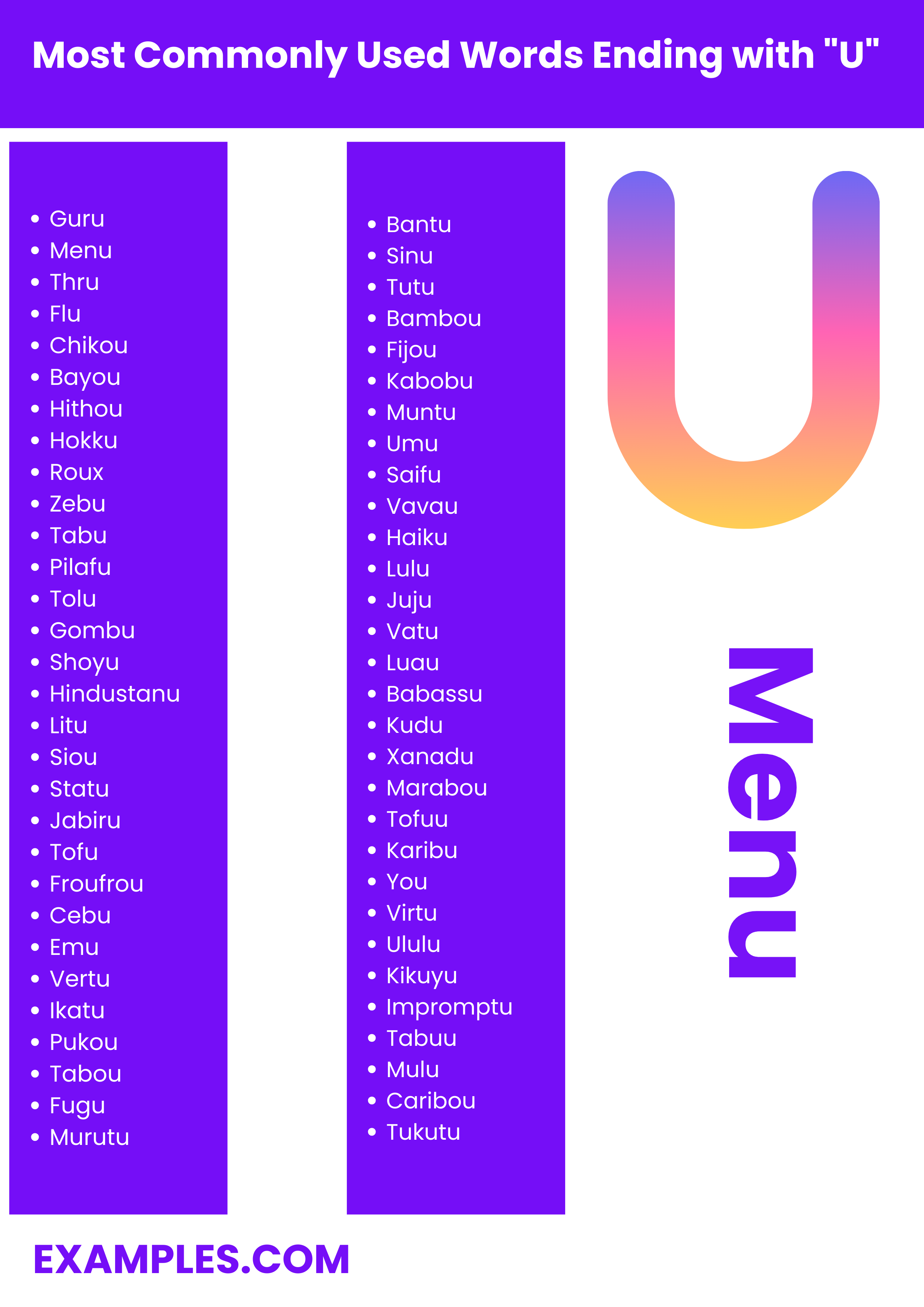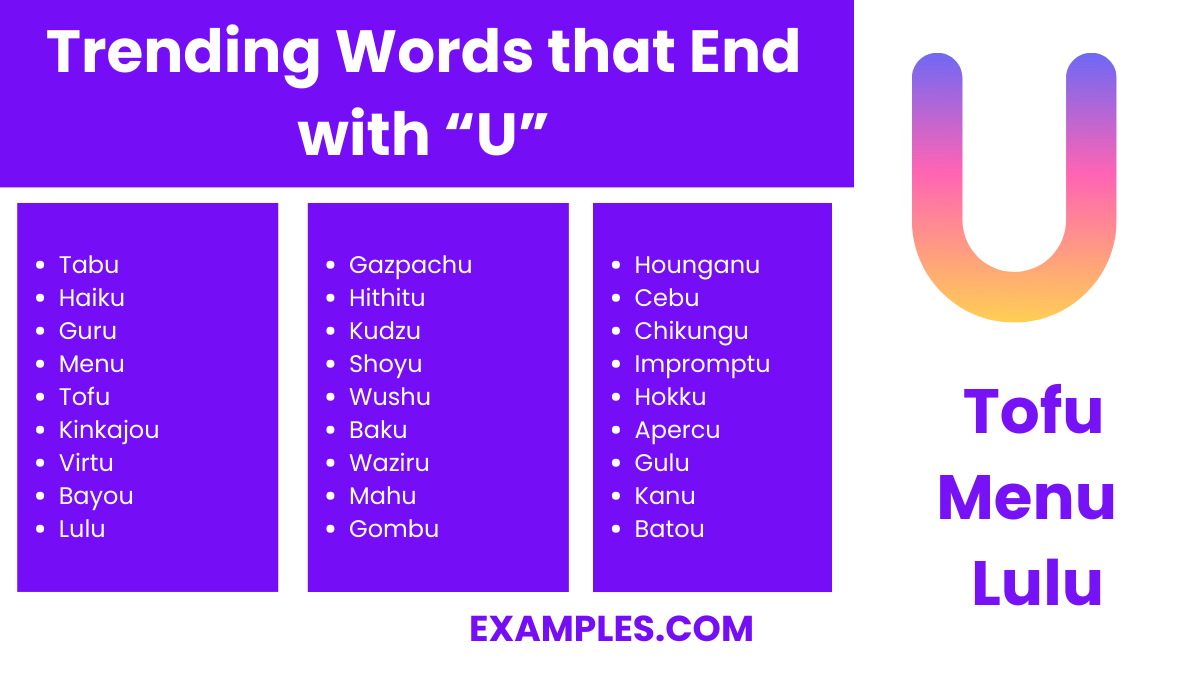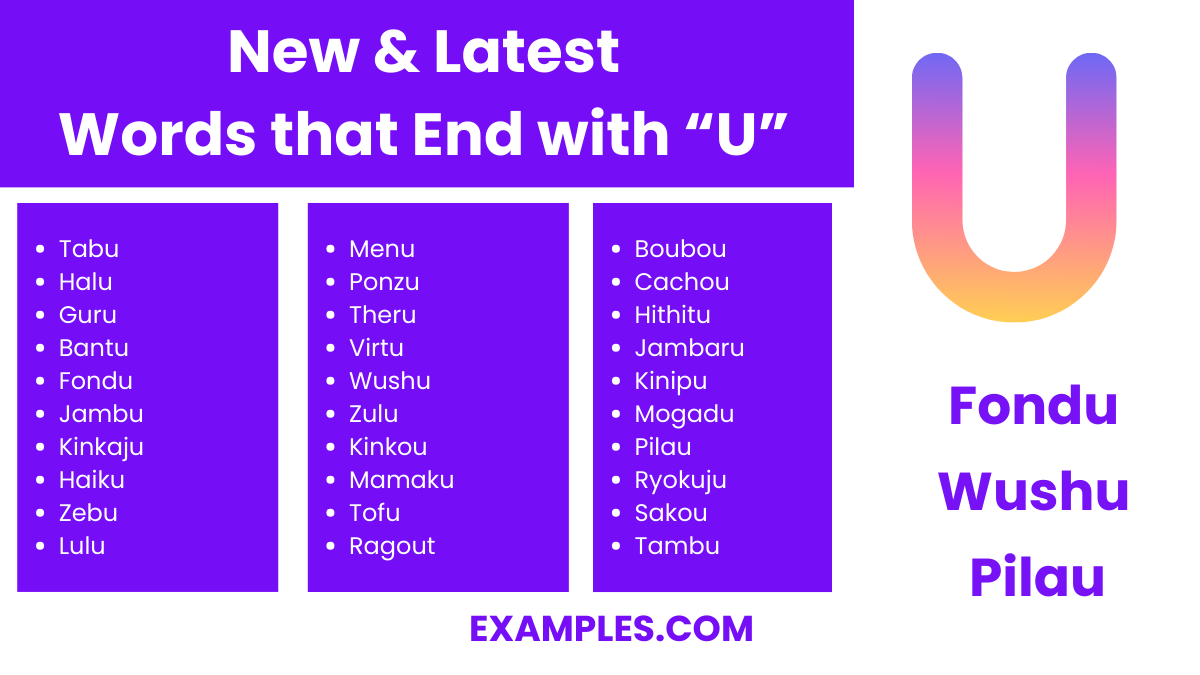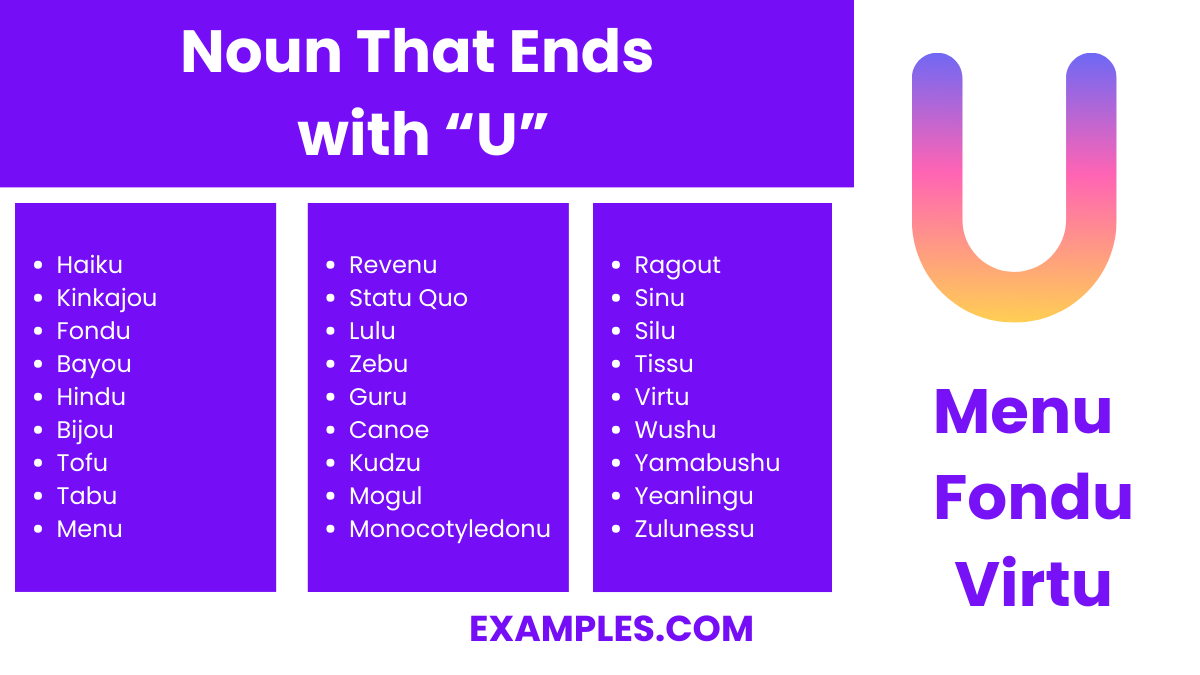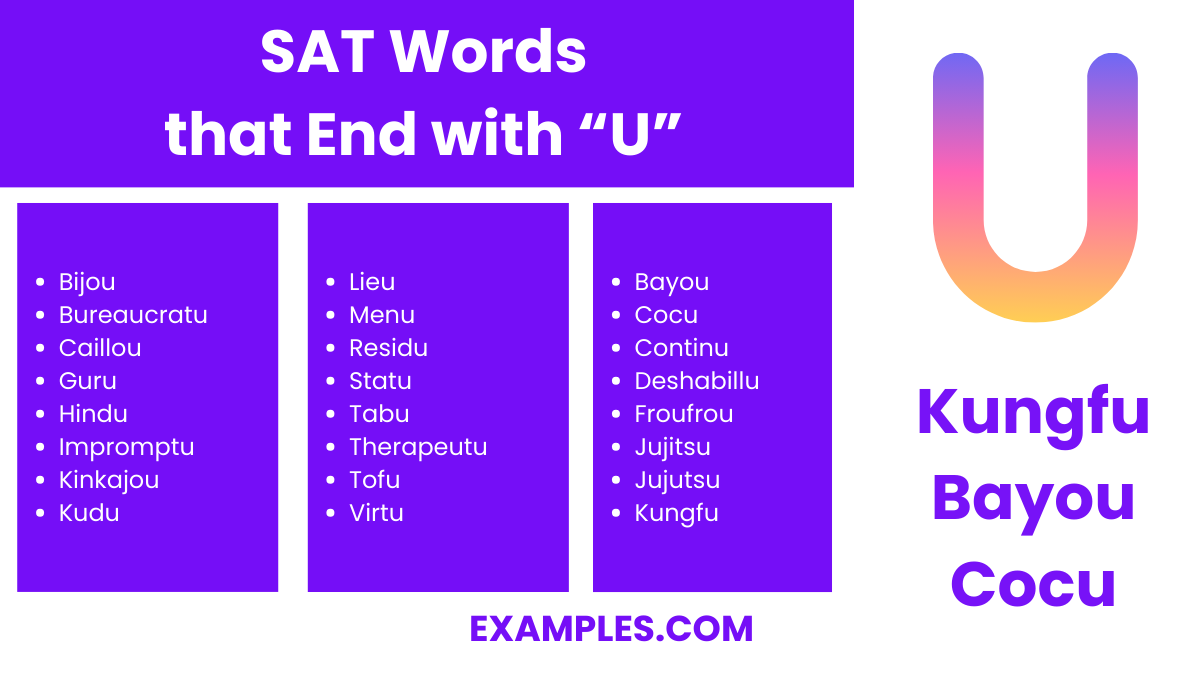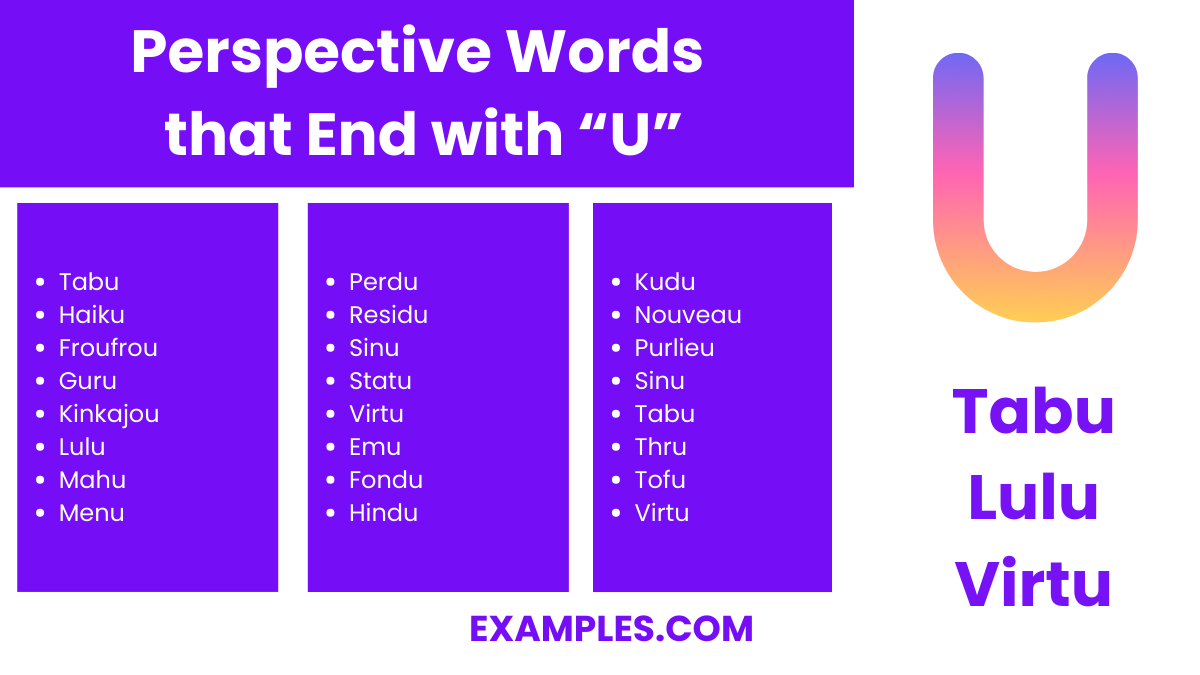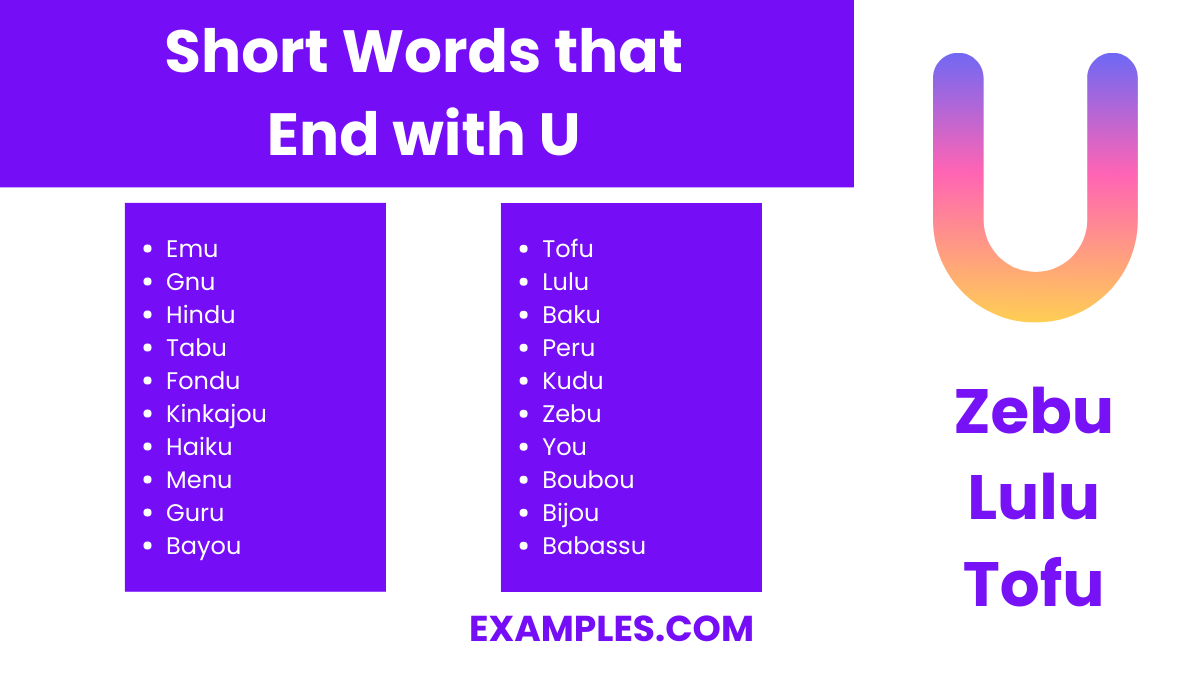150+ Words Ending With U List, Meaning, PDF
Words ending with ‘U’ possess a unique charm and can add a distinctive flavor to both spoken and written English. This guide focuses on exploring these ‘U’ words ending, offering valuable insights into their usage, nuances, and impact. Tailored for teachers and students, it aims to provide practical tips on how to effectively incorporate these words into writing and daily communication. Whether it’s enhancing a vocabulary lesson or crafting more engaging content, this article serves as a resourceful tool for those passionate about language and learning.
Download Most Commonly a Used Words Ending with U - PDF
60 Most Commonly Used Words Ending with “U”
Exploring words that conclude with the letter “U” offers an enriching pathway to diversifying one’s English vocabulary. Though not as common as words ending in other letters, those that finish with “U” possess a unique charm and utility across various linguistic settings, from casual dialogues to specialized domains. This compilation aims to serve as a comprehensive resource for educators, students, and language aficionados alike, presenting a selection of 50 words ending in “U.” Organized in a clear table format across six columns, this list facilitates easy learning and reference. Emphasizing Rhyming Words can enhance phonetic familiarity and poetic expression, while Daily Use English Words ensure practical applicability, making this collection a valuable asset for broadening one’s linguistic horizons and deepening the grasp of nuanced English.
| Guru | Tabu | Tofu | Bantu | Haiku | Karibu |
| Menu | Pilafu | Froufrou | Sinu | Lulu | You |
| Thru | Tolu | Cebu | Tutu | Juju | Virtu |
| Flu | Gombu | Emu | Bambou | Vatu | Ululu |
| Chikou | Shoyu | Vertu | Fijou | Luau | Kikuyu |
| Bayou | Hindustanu | Ikatu | Kabobu | Babassu | Impromptu |
| Hithou | Litu | Pukou | Muntu | Kudu | Tabuu |
| Hokku | Siou | Tabou | Umu | Xanadu | Mulu |
| Roux | Statu | Fugu | Saifu | Marabou | Caribou |
| Zebu | Jabiru | Murutu | Vavau | Tofuu | Tukutu |
Most Trending Words that End with “U”
In today’s rapidly evolving linguistic landscape, staying attuned to the latest trends is crucial for educators. The emergence of trending words ending in ‘U’ highlights the dynamic nature of language influenced by cultural, technological, and societal shifts. For teachers striving to incorporate contemporary and relevant content into their curriculum, this compilation of trending words ending with ‘U’ offers a valuable resource. Each word, emphasized in bold, is accompanied by a clear definition, enhancing ease of understanding and teaching. This list serves as a practical tool for educators wishing to refresh their teaching materials, making lessons more engaging and relatable for students. By focusing on singular & plural words and Compound Words, educators can further enrich students’ linguistic skills, preparing them for diverse communication scenarios.
- Tabu – Another spelling of ‘taboo’, referring to a social or religious custom prohibiting or restricting a particular practice.
- Haiku – A traditional form of Japanese poetry with a 5-7-5 syllabic structure.
- Guru – A spiritual teacher, especially in Indian religions.
- Menu – A list of dishes available in a restaurant.
- Tofu – A soft food made from processed soybeans.
- Kinkajou – A tropical American mammal with prehensile tail and long tongue, feeding on nectar and fruit.
- Virtu – Knowledge of or expertise in the fine arts.
- Bayou – A marshy outlet of a lake or river, typically found in the southeastern US.
- Lulu – An outstanding example of a particular type of person or thing.
- Gazpachu – A variant of ‘gazpacho’, a Spanish cold soup made from tomatoes and other vegetables.
- Hithitu – A term of affirmation or agreement in some cultures.
- Kudzu – A quick-growing East Asian climbing plant with large leaves, often used for fodder.
- Shoyu – Japanese soy sauce.
- Wushu – A Chinese martial art.
- Baku – The capital of Azerbaijan.
- Waziru – A title given to a minister or high official in certain Muslim countries.
- Mahu – A Hawaiian term referring to a person embodying both male and female spirit.
- Gombu – A name of Tibetan origin.
- Hounganu – A term used in certain cultures referring to a spiritual leader.
- Cebu – An island in the Philippines.
- Chikungu – A term from African languages, often related to societal roles.
- Impromptu – Done without being planned or rehearsed.
- Hokku – The opening stanza of a Japanese collaborative poem, precursor to the modern haiku.
- Apercu – A comment or brief reference that makes an insightful point.
- Gulu – A city in northern Uganda.
- Kanu – A name of African origin, often associated with strength.
- Batou – A name or term found in various cultures, sometimes associated with water or boats.
New & Latest Added Words that End with “U”
The English language is continually expanding, with new words regularly entering the lexicon, reflecting the ongoing evolution of culture, technology, and society. Particularly intriguing is the addition of words ending in ‘U,’ showcasing the language’s adaptability and growth. This compilation, featuring 30 new and recently added words ending with ‘U,’ offers a snapshot of this linguistic development. Ideal for educators seeking to infuse their teaching with up-to-date material and students aiming to stay current with language trends, each entry is highlighted in bold and accompanied by a definition for clarity. By incorporating these words into their vocabulary, learners can enhance their language skills, gaining a deeper understanding of English’s dynamic nature. Emphasizing Vowel Words and Sight Words within this context can further enrich learners’ linguistic abilities, providing a comprehensive approach to language acquisition.
- Tabu – An alternative spelling for taboo, referring to a social or religious custom prohibiting discussion or practice of a particular person, place, or thing.
- Halu – A term used in some cultures to describe a hallucinatory state or a profound daydream.
- Guru – A spiritual teacher or guide, especially in Indian religions.
- Bantu – Referring to a large group of indigenous African languages and the peoples who speak them.
- Fondu – A dish made of melted cheese or chocolate in which bread or fruits are dipped.
- Jambu – A tropical tree or fruit, also known as rose apple.
- Kinkaju – A nocturnal tree-dwelling mammal of Central and South America, resembling a small bear with a prehensile tail.
- Haiku – A traditional form of Japanese poetry consisting of three lines with a 5-7-5 syllable pattern.
- Zebu – A type of domesticated ox with a hump found in South Asia.
- Lulu – Something remarkable or outstanding.
- Menu – A list of available choices, especially of food and beverages.
- Ponzu – A citrus-based sauce used in Japanese cuisine.
- Theru – A word from Dravidian languages, often referring to a street or road.
- Virtu – An appreciation or knowledge of fine objects of art, antiques, and collectibles.
- Wushu – A Chinese martial art that combines performance and martial application.
- Zulu – Relating to the Zulu people of South Africa, their language, or culture.
- Kinkou – A state of balance or equilibrium, often used in the context of Eastern philosophy or medicine.
- Mamaku – A tree fern native to New Zealand.
- Tofu – A food made from pressed soybean curds, popular in East Asian cuisine.
- Ragout – A highly seasoned dish of meat cut into small pieces and stewed with vegetables.
- Boubou – A long, flowing garment worn in parts of Africa.
- Cachou – A lozenge made from liquorice used as a breath freshener or a mild antiseptic.
- Hithitu – A term from ancient texts, likely referring to a form of communication or agreement.
- Jambaru – A colloquial term possibly referring to a local dance or musical style in certain cultures.
- Kinipu – A word from indigenous languages, possibly denoting a type of plant or herbal remedy.
- Mogadu – A recent neologism, its specific meaning varies across different contexts.
- Pilau – A dish in which rice is cooked in a seasoned broth, often with meat or vegetables.
- Ryokuju – A term borrowed from another language, signifying a concept in philosophy or art.
- Sakou – A newly coined term, potentially relating to a cultural or artistic practice.
- Tambu – A word of African origin, likely pertaining to a form of music or dance.
Noun That Ends with “U”
The English nouns ending with ‘U’ uncovers a rich tapestry of language that spans across cultures and disciplines. These nouns, each with its unique origin and application, provide a fascinating study for both educators and learners. By integrating these nouns into the curriculum, teachers can offer students a broader linguistic perspective, enriching their vocabulary and fostering a deeper appreciation for the diversity of English. This list includes 30 nouns ending in ‘U,’ each highlighted in bold and accompanied by its definition, serving as a valuable educational resource. Amidst these nouns, terms related to Ness Words and Pictionary Words can further engage students, encouraging them to explore language in a creative and interactive manner. This approach not only enhances vocabulary but also stimulates curiosity and learning, making the exploration of nouns ending with ‘U’ a rewarding experience for all involved.
- Guru – A spiritual teacher or expert.
- Haiku – A traditional form of Japanese poetry.
- Kinkajou – A tropical American mammal.
- Fondu – A dish of melted cheese or chocolate.
- Bayou – A marshy outlet of a lake or river.
- Hindu – A follower of Hinduism.
- Bijou – A small, delicate, and exquisitely wrought piece of jewelry.
- Tofu – A soft food made from soy milk.
- Tabu – An alternate spelling of taboo, meaning something prohibited.
- Menu – A list of food and beverage offerings.
- Thru – An informal spelling of through.
- Statu Quo – The existing state of affairs.
- Lulu – Something remarkable or outstanding.
- Zebu – A type of domesticated ox.
- Canoe – A light, narrow boat with pointed ends.
- Kudzu – A fast-growing Asian climbing plant.
- Mogul – A powerful person in business or industry.
- Monocotyledonu – A plant with one embryonic seed leaf.
- Ragout – A highly seasoned dish of meat cut into small pieces.
- Revenu – An alternate form of revenue, income.
- Sinu – A muscular bodily part or organ.
- Silu – A type of fish.
- Tissu – A fine open-mesh fabric.
- Virtu – Knowledge or love of fine arts.
- Wushu – A Chinese martial art.
- Yamabushu – A Japanese mountain ascetic hermit monk.
- Yeanlingu – A young lamb.
- Zulunessu – The quality or state of being Zulu.
Describing Words That End with “U”
Exploring the nuances of the English language, we delve into the unique category of describing words ending with ‘U’. These adjectives, though rare, add a special flair to expressions, making language more vivid and engaging. Teachers seeking to broaden their students’ vocabulary will find this list particularly enriching. It offers a creative avenue for enhancing written and spoken communication, encouraging students to explore beyond conventional descriptors. Among these, Encouraging Words and Funny Words stand out, providing a blend of positivity and humor that can uplift and entertain. This exploration not only broadens linguistic horizons but also injects joy and inspiration into the learning process, showcasing the playful and supportive aspects of language.
- Tabu – Forbidden or prohibited due to social customs.
- Sinu – Relating to the sinews or tendons.
- Halu – A term used in South Indian cuisine to describe a type of milky dessert.
- Ragou – Suggestive of a stew or a mixed dish.
- Froufrou – Elaborate or showy ornamentation.
- Pilau – Relating to a Middle Eastern or South Asian dish made with rice.
- Bijou – Small and elegant; a jewel.
- Cocu – A man whose wife is unfaithful.
- Virtu – An appreciation of or taste for fine objects of art.
- Habu – Pertaining to a type of venomous snake found in East Asia.
- Impromptu – Done without being planned or rehearsed.
- Statu – Relating to a statute or law.
- Haiku – A traditional form of Japanese poetry.
- Tutu – A type of skirt worn by ballet dancers.
- Thank-you – Expressing gratitude.
- Lieu – In place of; instead.
- Kinkajou – A tropical American mammal with prehensile tail, related to the raccoon.
- Froufrou – A rustling or swishing sound.
- Kudu – A type of African antelope.
- Barbu – A term used in zoology referring to certain types of fish.
- Fondu – A variant of fondue, especially in the context of ballet.
- Guru – A spiritual teacher or guide.
- Menu – A list of dishes available in a restaurant.
- Residu – The remaining part of something.
SAT Words That End with “U”
The depths of SAT preparation, focusing on less common but impactful vocabulary can give students an edge. Words ending in ‘U’ are a goldmine for those looking to enhance their linguistic arsenal for the SAT. This curated list includes SAT words that are not part of everyday vernacular, making them ideal candidates for test preparation. Teachers aiming to bolster their students’ readiness and students striving to elevate their SAT scores will find this collection invaluable. Each selected word is emphasized in bold, accompanied by its definition, ensuring clarity and aiding memorization. Integrating these words into study sessions can significantly improve understanding and application, turning them into powerful tools for achieving higher SAT scores. Among these, Pictionary Words can also serve as a fun and interactive way to engage with these challenging terms, transforming study time into an enjoyable learning experience.
- Bijou – Small and elegant; a jewel.
- Bureaucratu – An official in a government department, particularly one perceived as being concerned with procedural correctness at the expense of people’s needs.
- Caillou – A small, round pebble.
- Guru – A spiritual teacher, especially one who imparts initiation.
- Hindu – A follower of Hinduism.
- Impromptu – Done without being planned or rehearsed.
- Kinkajou – A tropical American mammal with prehensile tail and long, extensible tongue, feeding on nectar and fruit.
- Kudu – A large African antelope with long spiral horns.
- Lieu – Instead.
- Menu – A list of dishes available in a restaurant.
- Residu – The remaining part of something.
- Statu – A written law passed by a legislative body.
- Tabu – Prohibited or restricted by social custom.
- Therapeutu – Relating to the healing of disease.
- Tofu – A soft, white food made from soybeans.
- Virtu – Knowledge of or expertise in the fine arts.
- Bayou – A marshy outlet of a lake or river.
- Cocu – A man whose wife is unfaithful.
- Continu – To carry on or persist in.
- Deshabillu – The state of being only partly or scantily clothed.
- Froufrou – A rustling, especially the rustling of a woman’s dress.
- Jujitsu – A Japanese system of unarmed combat and physical training.
- Jujutsu – A method of defending oneself without the use of weapons, involving various holds and techniques.
- Kungfu – A primarily unarmed Chinese martial art resembling karate.
- Machu – Referring to Machu Picchu, an ancient Incan city.
- Menu – A list of food and beverage offerings.
Perspective Words that End with “U”
Words ending in ‘U’ unveils a treasure trove of nuanced vocabulary. This exploration into perspective words, though they might appear less commonly in daily discourse, reveals a spectrum of meanings that can significantly enrich one’s command of English. Such words are gems for educators striving to inject diversity and depth into vocabulary lessons. Presented herein are 30 select words ending with ‘U,’ each highlighted for emphasis and accompanied by its definition. This compilation is crafted to serve educators in broadening the vocabularies and perspectives of their students, offering a bridge to more sophisticated expression and understanding. Among the list, Dictation Words and Difficult Words are emphasized, underscoring their potential to challenge and engage learners in developing a more robust and versatile linguistic repertoire.
- Tabu – Prohibited or restricted by social custom.
- Haiku – A Japanese form of short poetry.
- Froufrou – Elaborate or frilly decoration.
- Guru – A spiritual teacher or expert in a particular field.
- Kinkajou – A tropical American mammal with a prehensile tail.
- Lulu – Something remarkable or outstanding.
- Mahu – In Hawaiian culture, a person embodying both male and female traits.
- Menu – A list of food and beverage offerings.
- Perdu – Lost or hidden, especially in a military context.
- Residu – Residue, a remnant or leftover.
- Sinu – Relating to the sinews or tendons.
- Statu – A variant of ‘statute,’ referring to a written law.
- Virtu – Knowledge or love of fine arts and antiques.
- Emu – A large flightless bird native to Australia.
- Fondu – A dish of melted cheese or chocolate.
- Hindu – A follower of Hinduism.
- Kudu – An African antelope with spiraled horns.
- Nouveau – New and fashionable, often referring to art.
- Purlieu – The area near or surrounding a place.
- Sinu – Another spelling for ‘sinew,’ a tendon.
- Tabu – An alternate spelling for ‘taboo,’ meaning prohibited.
- Thru – An informal spelling of ‘through.’
- Tofu – A soft food made from soybeans.
- Virtu – Goodness or moral excellence.
- Zebu – A humped domestic cattle found in Asia and Africa.
Short Words that End with U
Exploring the world of English with a focus on short words ending in ‘U’ opens up a unique linguistic avenue. These compact yet meaningful words can significantly enhance a learner’s vocabulary. Ideal for educators aiming to captivate and broaden the linguistic horizons of their students, this collection presents a range of words that are both accessible and insightful. Incorporating Praising Words and Sight Words into lessons can invigorate the learning experience, making it more interactive and rewarding. Each word is carefully selected and presented in bold, accompanied by its definition, to ensure clarity and aid in the learning process. This approach not only enriches vocabulary but also fosters a deeper engagement with the subtleties of the English language.
- Emu – A large flightless bird native to Australia.
- Gnu – A large African antelope with a head like an ox.
- Hindu – A follower of Hinduism or relating to Hinduism.
- Tabu (alternate spelling of taboo) – Prohibited or restricted by social custom.
- Fondu – A dish of melted cheese or other ingredients, served with bread for dipping.
- Kinkajou – A rainforest mammal of Central and South America.
- Haiku – A form of Japanese poetry.
- Menu – A list of food and beverages offered in a restaurant.
- Guru – A spiritual teacher or expert in a specific field.
- Bayou – A marshy inlet or outlet of a river or lake, especially in parts of the southern United States.
- Tofu – A food made from pressed soybean curd.
- Lulu – Something outstanding or remarkable.
- Baku – The capital of Azerbaijan.
- Peru – A country in South America.
- Kudu – A type of African antelope.
- Zebu – A type of domesticated ox.
- You – Used to refer to the person or people being spoken or written to.
- Boubou – A long, flowing garment worn in parts of Africa.
- Bijou – A small, elegant trinket or piece of jewelry.
- Babassu – A palm tree native to Brazil.
- Mahu – A term in Hawaiian and Tahitian cultures for a third gender.
- Hurlu – A member of a 16th-century French religious sect.
- Yahu – An exclamation of excitement or triumph.
- Moku – An island or islet in Hawaiian.
In conclusion, exploring words ending with ‘U’ offers a unique approach to language learning. These words, rich in cultural diversity and positive connotations, can greatly enhance communication skills. Teachers and students are encouraged to incorporate these words into their vocabulary to add depth and variety. Emphasizing such words in teaching can also make learning more engaging and culturally enlightening.



